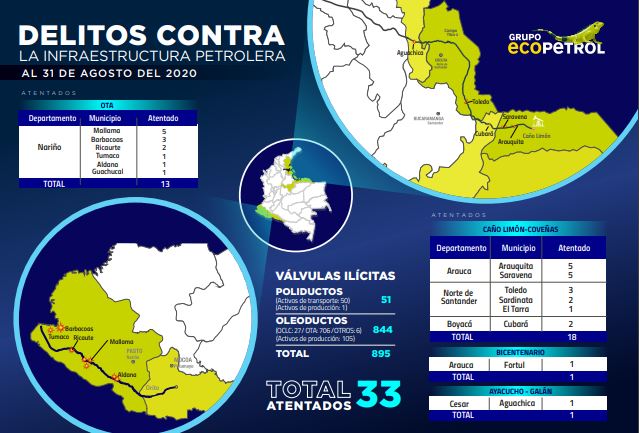Ecopetrol warns of an increase in illegal valves in transportation systems
September 30, 2020by randleysasNews
- In the first eight months of the year, nearly 900 illegal connections in transportation pipelines were identified..
- During this period, crime has stolen around 2,500 barrels of hydrocarbons per day..
- At least 20 municipalities in the country have been affected by this criminal practice..
- The Company invites communities to report this crime to the authorities.
Ecopetrol reports that between January and August 2020, about 900 illegal valves have been identified and removed in the hydrocarbon transportation pipelines throughout the country, which means that every day, on average, 3 illegal connections occur through which illegal groups steal crude oil or refined fuels.
The trend of installing illicit valves is on the rise if it takes into account that with the shutdown at the same period in 2019, about 747 illegal connections were detected in the pipelines and multiple pipelines.
In total, this year there is a theft of 2,500 barrels per day of hydrocarbons on average, of which 2,439 correspond to crude oil, the majority coming from the Caño Limón-Coveñas pipeline.
The seizure of hydrocarbons, as it is technically called, is a crime that puts neighboring communities at risk (especially due to fuel) and affects the environment (mainly due to spilled oil), since this type of illicit facilities is made in a rudimentary or artisanal way and sometimes it leaves product leaks that affect soils and water resources and impact flora and fauna.
Among the most affected systems are the Transandino oil pipelines (OTA), in which 706 illegal perforations have been found, the majority in the municipalities of Tumaco, Ricaurte and Barbacoas, in Nariño, and the Caño Limón – Coveñas with 27 illegal valves. the majority in the municipalities of Tibú and El Tarra in Norte de Santander.
Regarding the fuel transportation systems, there are 50 illicit installations, the majority in the Pozos Colorados – Galán pipeline that runs from Santa Marta to Barrancabermeja. The registries in this system show a total of 12 illegal acts, mainly in the municipalities of Ciénaga and Aracataca, in Magdalena, and Aguachica and Rio de Oro, in Cesar.
In the center of the country, there are also damages caused by the theft of fuel from the Sebastopol – Salgar pipelines in Magdalena Medio, and Sebastopol – Tocancipá. In these cases, the events have been recorded in towns such as Puerto Boyacá, Barrancabermeja, Cimitarra, Puerto Salgar, Suesca and Lenguazaque, among others.
In the last three months, this crime has intensified in the west of the country where fuel theft was recorded in the Cartago-Yumbo and Yumbo-Buenaventura pipelines, at the level of the Guacarí, Buenaventura and Dagua municipalities.


